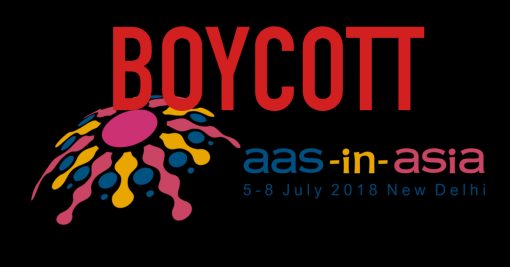The convenor and the presenters of the panel ‘Feminist Reframings of India’s Northeast: Gendered Geographies and Genealogies’ have decided to withdraw our panel from the AAS-in-Asia, 2018 Conference. The panel has made this decision in the light of how the denial of visas to scholars from Pakistan was handled by AAS and Ashoka University. The Association has kept this news away from all other participants of the conference. The official email from your side, which contained this information, was sent to us only on the 12th of June 2018. The email states that the ‘Pakistani scholars were informed about the MEA decision and these decisions vie email on 20th March’. This also includes scholars of Pakistani origin who have other passports. All other participants came to know about this only in June. The association did not feel the need to inform any of the remaining participants about what was happening to their Pakistani colleague until post June. 1stJune was the deadline after which any withdrawal of participants / conference meant that the association retained 100% of the registration fees. The decision to put up a statement so late seems to be a decision made by the association to both retain the registration and also make participants continue with the conference as logistics of travel and stay (all finances of which are borne by the participants) had already been made.
The association has, since the first statement, reiterated the power of the nation state to permit or deny visas to scholars. Currently, the second statement put up by AAS states ‘We believe that fostering intellectual exchange is often the best means of support, even though in many instances this will involve compromises rather than stance of absolute moral purity’. The call for boycott of AAS conference is read as some stance of moral purity and not reiterating the need for academic exchange. The academic and intellectual exchange that the association speaks about minus (in the words of the association) ‘scholars from countries considered “sensitive”’ is something that the association has to recognise as un-freedom and not a stance of moral purity as the association accuses the calls for boycott. This panel also emerges from a region read through the lens of geopolitics as “conflict ridden” and “sensitive”. We recognise how certain categories overdetermine all other readings and the consequences this has for scholars and their academic works. In solidarity with the larger call for boycott of the AAS-in-Asia and with colleagues denied this opportunity because of their nationality or ‘origin’ we join the larger call for boycott and also withdraw our panel from AAS.
Originally published by Raiot. Repblished here with permission from the signatories.





